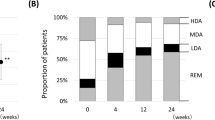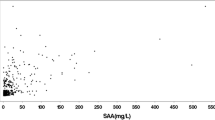Abstract
Objectives
To evaluate the utility of elevated serum P-glycoprotein (P-gp) as a risk marker of therapeutic response failure in rheumatoid arthritis (RA) patients treated with disease-modifying antirheumatic drugs (DMARDs).
Methods
A cross-sectional study was conducted in 151 RA patients. Patients were classified into two groups according to the response achieved in terms of the disease activity score (DAS)28 after ≥ 6 months: (1) patients with a therapeutic response to DMARDs, with DAS28 < 3.2; and (2) patients without a response to DMARDs, with persistent DAS28 ≥ 3.2. We explored a wide group of clinical factors associated with therapeutic resistance. Serum P-gp levels were measured by ELISA. The risk of P-gp elevation as a marker of failure to achieve a therapeutic response to DMARDs was computed using multivariate logistic regression.
Results
Serum P-gp levels were significantly higher in RA patients (n = 151) than in the controls (n = 30) (158.70 ± 182.71 ng/mL vs. 14.12 ± 8.97 ng/mL, p < 0.001). The P-gp level was correlated with the DAS28 score (r = 0.39, p < 0.001). RA patients with DMARD failure had higher serum P-gp levels than patients with a therapeutic response (206 ± 21.47 ng/mL vs 120.60 ± 15.70 ng/mL; p = 0.001). High P-gp levels increased the risk of DMARD failure (OR 3.36, 95% CI 1.54–7.27, p = 0.001). After adjusting for confounding variables, elevated P-gp remained associated with DMARD failure (OR 2.64, 95% CI 1.29–5.40, p = 0.01).
Conclusion
Elevated serum P-gp is associated with DMARD failure. The P-gp level can be considered a clinical tool for evaluating the risk of DMARD failure in patients; however, future prospective studies should be performed to evaluate the utility of this marker in predicting long-term responses.
Similar content being viewed by others
References
Agarwal V, Mittal SK, Misra R (2009) Expression of multidrug resistance-1 protein correlates with disease activity rather than the refractoriness to methotrexate therapy in rheumatoid arthritis. Clin Rheumatol 28:427–433. https://doi.org/10.1007/s10067-008-1071-1
Arnett FC, Edworthy SM, Bloch DA et al (1988) The American Rheumatism Association 1987 revised criteria for the classification of rheumatoid arthritis. Arthritis Rheum 31:315–324. https://doi.org/10.1002/art.1780310302
Bauer B, Hartz AMS, Fricker G, Miller DS (2004) Pregnane X receptor up-regulation of P-glycoprotein expression and transport function at the blood-brain barrier. Mol Pharmacol 66:413–419. https://doi.org/10.1124/mol.66.3
Binkhathlan Z, Lavasanifar A (2013) P-glycoprotein inhibition as a therapeutic approach for overcoming multidrug resistance in cancer: current status and future perspectives. Curr Cancer Drug Targets 12:326–346. https://doi.org/10.2174/15680096113139990076
Bombardier C, Hazlewood GS, Akhavan P et al (2012) Canadian Rheumatology Association recommendations for the pharmacological management of rheumatoid arthritis with traditional and biologic disease-modifying antirheumatic drugs: part II safety. J Rheumatol 39:1583–1602. https://doi.org/10.3899/jrheum.120165
Callaghan R, Crowley E, Potter S, Kerr ID (2008) P-glycoprotein: so many ways to turn it on. J Clin Pharmacol 48:365–378. https://doi.org/10.1177/0091270007311568
Cardiel MH, Pons-Estel BA, Sacnun MP et al (2012) Treatment of early rheumatoid arthritis in a multinational inception cohort of latin american patients. J Clin Rheumatol 18:327–335. https://doi.org/10.1097/rhu.0b013e31826d6610
Cardiel MH, Díaz-Borjón A, del Mercado Vázquez, Espinosa M et al (2014) Update of the mexican college of rheumatology guidelines for the pharmacologic treatment of rheumatoid arthritis. Reumatol Clín (English Ed). 10:227–240. https://doi.org/10.1016/j.reumae.2013.10.006
Chiampanichayakul S, Anuchapreeda S, Chruewkamlow N et al (2010) Production of monoclonal antibodies to P-glycoprotein: its application in detection of soluble and surface P-glycoprotein of leukemia patients. Int J Hematol 92:326–333. https://doi.org/10.1007/s12185-010-0668-8
Chu TM, Lin TH, Kawinski E (1994) Detection of soluble P-glycoprotein in culture media and extracellular fluids. Biochem Biophys Res Commun 203:506–512. https://doi.org/10.1006/bbrc.1994.2211
Goycochea-Robles MV, Arce-Salinas CA, Guzmán-Vázquez S, Cardiel-Ríos MH (2007) Prescription rheumatology practices among mexican specialists. Arch Med Res 38:354–359. https://doi.org/10.1016/j.arcmed.2006.11.008
Juliano RL, Ling V (1976) A surface glycoprotein modulating drug permeability in chinese hamster ovary cell mutants. Biochim Biophys Acta 455:152–162. https://doi.org/10.1016/0005-2736(76)90160-7
Kansal A, Tripathi D, Rai MK, Agarwal V (2015) Persistent expression and function of P-glycoprotein on peripheral blood lymphocytes identifies corticosteroid resistance in patients with systemic lupus erythematosus. Clin Rheumatol. https://doi.org/10.1007/s10067-015-3079-7
Kato T, Mizutani K, Kameyama K et al (2015) Serum exosomal P-glycoprotein is a potential marker to diagnose docetaxel resistance and select a taxoid for patients with prostate cancer. Urol Oncol 33:385.e15–385.e20. https://doi.org/10.1016/j.urolonc.2015.04.019
Machado DA, Guzman RM, Xavier RM et al (2014) Open-label observation of addition of etanercept versus a conventional disease-modifying antirheumatic drug in subjects with active rheumatoid arthritis despite methotrexate therapy in the latin american region. J Clin Rheumatol 20:25–33. https://doi.org/10.1097/rhu.0000000000000055
Nigam SK (2014) What do drug transporters really do? Nat Rev Drug Discov 14:29–44. https://doi.org/10.1038/nrd4461
Perez-Guerrero EE, Gamez-Nava JI, Muñoz-Valle JF et al (2018) Serum levels of P-glycoprotein and persistence of disease activity despite treatment in patients with systemic lupus erythematosus. Clin Exp Med 18:109–117. https://doi.org/10.1007/s10238-017-0459-0
Prasad S, Tripathi D, Rai MK et al (2014) Multidrug resistance protein-1 expression, function and polymorphisms in patients with rheumatoid arthritis not responding to methotrexate. Int J Rheum Dis 17:878–886. https://doi.org/10.1111/1756-185x.12362
Prevoo MLL, Van’T Hof MA, Kuper HH et al (1995) Modified disease activity scores that include twenty-eight-joint counts development and validation in a prospective longitudinal study of patients with rheumatoid arthritis. Arthritis Rheum 38:44–48. https://doi.org/10.1002/art.1780380107
Silva R, Vilas-Boas V, Carmo H et al (2015) Modulation of P-glycoprotein efflux pump: induction and activation as a therapeutic strategy. Pharmacol Ther 149:1–123. https://doi.org/10.1016/j.pharmthera.2014.11.013
Singh JA, Saag KG, Bridges SLJ et al (2016) 2015 American College of Rheumatology guideline for the treatment of rheumatoid arthritis. Arthritis Care Res (Hoboken) 68:1–25. https://doi.org/10.1002/acr.22783
Smolen JS, Landewé R, Breedveld FC et al (2014) EULAR recommendations for the management of rheumatoid arthritis with synthetic and biological disease-modifying antirheumatic drugs: 2013 update. Ann Rheum Dis 73:492–509. https://doi.org/10.1136/annrheumdis-2013-204573
Suzuki K, Saito K, Tsujimura S et al (2010) Tacrolimus, a calcineurin inhibitor, overcomes treatment unresponsiveness mediated by P-glycoprotein on lymphocytes in refractory rheumatoid arthritis. J Rheumatol 37:512–520. https://doi.org/10.3899/jrheum.090048
Taylor PC, Alten R, Gomez-Reino JJ et al (2018) Clinical characteristics and patient-reported outcomes in patients with inadequately controlled rheumatoid arthritis despite ongoing treatment. RMD Open 4:e000615. https://doi.org/10.1136/rmdopen-2017-000615
Tsujimura S, Saito K, Nawata M et al (2008) Overcoming drug resistance induced by P-glycoprotein on lymphocytes in patients with refractory rheumatoid arthritis. Ann Rheum Dis 67:380–388. https://doi.org/10.1136/ard.2007.070821
Tsujimura S, Saito K, Nakayamada S, Tanaka Y (2010) Etanercept overcomes P-glycoprotein-induced drug resistance in lymphocytes of patients with intractable rheumatoid arthritis. Mod Rheumatol 20:139–146. https://doi.org/10.1007/s10165-009-0247-0
Tsujimura S, Adachi T, Saito K et al (2017) Relevance of P-glycoprotein on CXCR4+ B cells to organ manifestation in highly active rheumatoid arthritis. Mod Rheumatol. https://doi.org/10.1080/14397595.2017.1341458
Vasconcelos C, Faria R (2012) Therapeutic resistance in autoimmune diseases. Lupus. https://doi.org/10.1177/0961203312462266
Funding
This project was financed by a grant from the Mexican Institute for Social Security (IMSS), Fondo de Investigación en Salud (FIS), Grant no. FIS/IMSS/PROT/G14/1296.
Author information
Authors and Affiliations
Corresponding author
Ethics declarations
Conflict of interest
The authors declare that there are no conflicts of interest to disclose.
Ethical approval
Comité Local de Investigación y Ética en Salud 1301. Hospital de Especialidades, Centro Médico Nacional de Occidente LIC. IGNACIO GARCIA TELLEZ, Jalisco. Date when the study was approved: April 11th, 2014. Reference Number of approval: R-2014-1301-77.
Rights and permissions
About this article
Cite this article
Perez-Guerrero, E.E., Gonzalez-Lopez, L., Muñoz-Valle, J.F. et al. Serum P-glycoprotein level: a potential biomarker of DMARD failure in patients with rheumatoid arthritis. Inflammopharmacol 26, 1375–1381 (2018). https://doi.org/10.1007/s10787-018-0529-2
Received:
Accepted:
Published:
Issue Date:
DOI: https://doi.org/10.1007/s10787-018-0529-2




